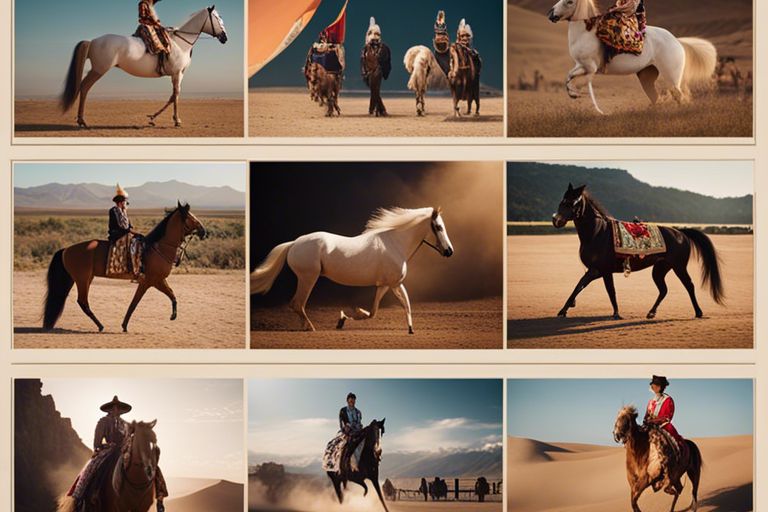Just imagine the majestic beauty of horses galloping across vast plains, symbolizing strength, freedom, and grace in various cultures worldwide. In this blog post, you will examine into the significant roles these noble creatures play in societies around the globe, from being revered as sacred in some to serving as imperative partners in work and travel in others. Let’s launch on an enlightening journey into the diverse and fascinating connections between horses and humanity.
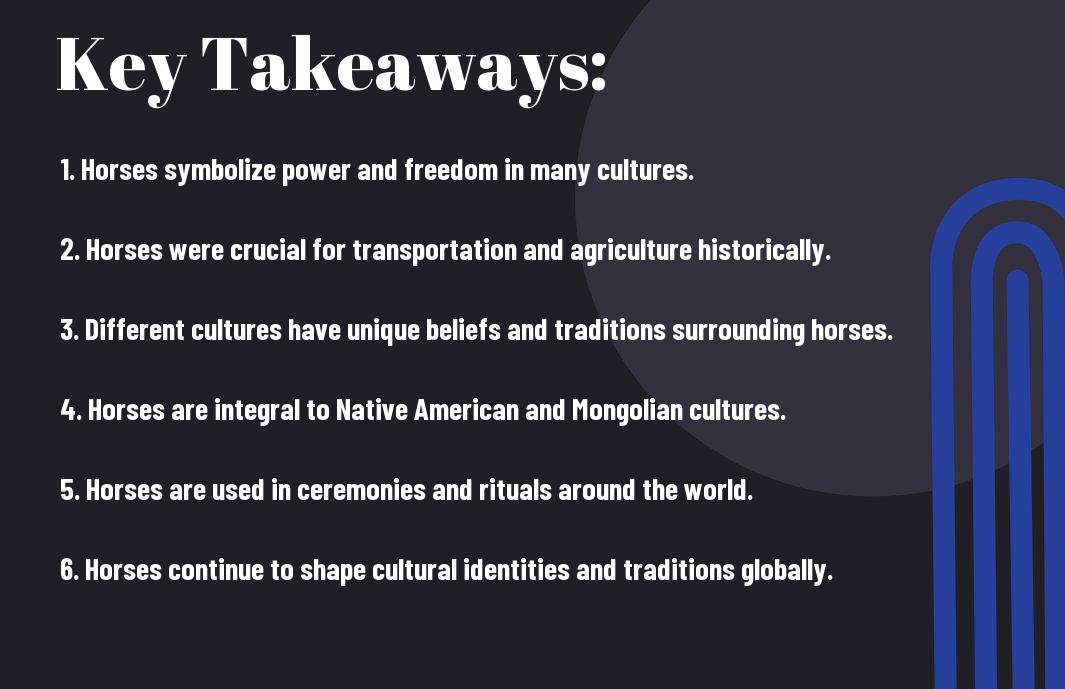
The Role of Horses in Different Cultures: Historical Significance
Ancient Civilizations
The relationship between horses and humans dates back thousands of years. Ancient civilizations such as the Egyptians, Greeks, and Romans valued horses for their versatility and strength. Horses played a crucial role in transportation, warfare, agriculture, and even cultural and religious ceremonies. Not only were they important for trade and communication, but they also symbolized wealth and power.
Medieval Period
One of the most significant periods in history that further solidified the bond between humans and horses is the Medieval Period. Knights and cavalry relied heavily on horses for battle, making them vital assets on the battlefield. These powerful animals were prized for their speed, agility, and strength, giving riders a tremendous advantage during warfare. Knights formed strong bonds with their horses, often considering them loyal companions and trusted allies.
To better understand the importance of horses during the Medieval Period, you can imagine being a knight in full armor, charging into battle on horseback. The speed and power of your horse would not only carry you into the heart of the enemy forces but also provide you with mobility and protection on the battlefield.
Spiritual and Mythological Importance
Some cultures have long revered horses for their spiritual and mythological significance. These majestic animals have played vital roles in various belief systems, embodying traits like strength, freedom, and wisdom.
Native American Cultures
American Native cultures often depict horses as symbols of power, courage, and endurance. They believed that horses were spiritual guides that connected the physical and spiritual worlds. The bond between the Native Americans and horses was so profound that these animals were considered sacred beings, often incorporated into ceremonies and rituals.
Celtic and Norse Mythologies
Importance in Celtic and Norse Mythologies
Norse mythology, closely linked to Celtic beliefs, also revered horses as divine creatures associated with gods and goddesses. In Norse mythology, horses were said to possess supernatural abilities, such as the ability to travel between worlds or pull the sun across the sky. These creatures were highly esteemed and often portrayed in a positive light, symbolizing strength, fertility, and swiftness.
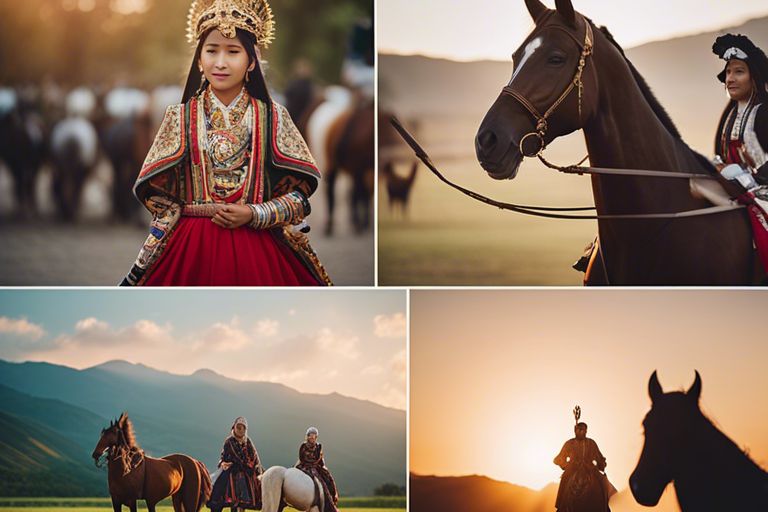
Transportation and Trade
The Silk Road
To understand the importance of horses in transportation and trade, one must look back at the ancient Silk Road. Silk Road was a network of trade routes connecting the East and West, stretching from China to the Mediterranean. Horses played a crucial role in the success of the Silk Road, as they were the primary mode of transportation for goods and travelers across vast distances. Their strength and endurance allowed for the efficient movement of valuable commodities such as silk, spices, and precious metals.
The American West
Road trip through the history of the American West and you’ll find that horses were integral to transportation and trade in this rugged frontier. Settlers, traders, and cowboys relied on horses to navigate the vast and unforgiving landscapes of the wild west. These majestic animals were not only a mode of transportation but also imperative for carrying goods, such as furs, and assisting in the development of new settlements.
As you journey through the history of the American West, you’ll encounter tales of daring cowboys herding cattle across long distances, Native American tribes utilizing horses for hunting and warfare, and settlers relying on these strong steeds for their daily survival. Horses in the American West represented freedom, resilience, and adaptability, becoming a symbol of the pioneering spirit that defined this era. Their role in transportation and trade was crucial in shaping the economic and cultural landscape of the frontier.
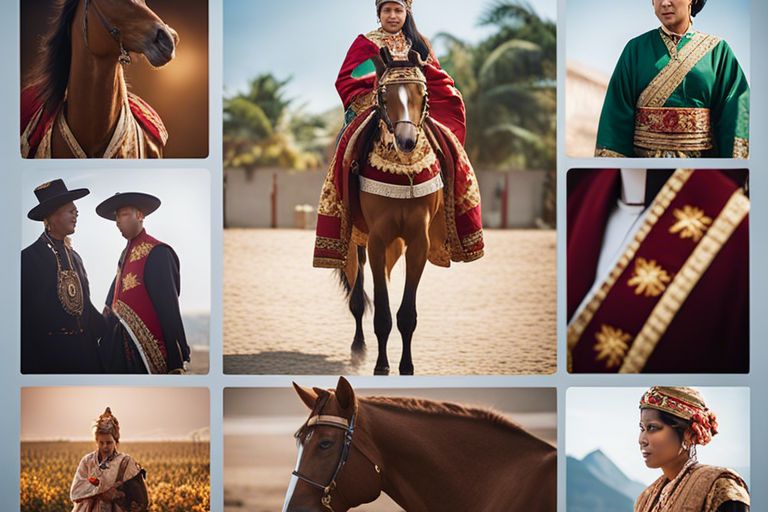
Symbolism and Artistic Expression
Despite the diverse ways in which horses are revered and utilized in different cultures, their symbolic significance transcends borders and is often depicted in various forms of artistic expression.
Horse in Chinese Culture
One of the oldest civilizations in the world, **Chinese culture** holds the horse in high esteem. In Chinese art and mythology, the horse is often associated with power, success, and prosperity. Symbolizing speed, endurance, and elegance, the image of the horse is frequently used to represent overcoming obstacles and achieving victory in traditional Chinese paintings and sculptures. Additionally, **horses** have played a crucial role in Chinese history, particularly in warfare and transportation, further solidifying their symbolism in Chinese culture.
Horse in Western Art
Artistic representations of horses have been a prominent feature in Western art for centuries. **Horses** have been depicted in various mediums, including paintings, sculptures, and tapestries, showcasing their beauty, grace, and strength. These artworks often depict horses in different contexts, such as battle scenes, pastoral settings, and racing events. The horse has been a central subject for many famous artists, symbolizing freedom, nobility, and the untamed spirit of nature.
Artistic
Horse imagery in Western art has evolved over time, reflecting changing cultural attitudes towards these majestic animals. Artists have explored themes of companionship, work, and sport in their representations of **horses**, capturing the dynamic relationship between humans and these creatures. Whether portrayed realistically or symbolically, horses continue to inspire artists and viewers alike, evoking a sense of awe and admiration for their unparalleled beauty and spirit.
Modern-Day Significance
Keep reading to learn about how horses continue to play a significant role in various cultures around the world today.
Therapeutic Riding
Riding has therapeutic benefits that can help individuals with physical, mental, and emotional challenges. Therapeutic riding programs use interactions with horses to improve coordination, balance, and muscle strength. Additionally, the bond formed between the rider and the horse can boost confidence and emotional well-being.
Competitive Sports
Riding in competitive sports ranges from dressage to show jumping and polo, showcasing the athleticism of both horse and rider. These sports require precision, skill, and teamwork between the horse and the rider. Competitive sports provide an avenue for riders to showcase their abilities and compete at various levels, from local competitions to international events.
Plus, competitive sports can be physically demanding and sometimes dangerous, requiring both the rider and the horse to be in top condition. However, the thrill of competition and the bond formed between horse and rider make the challenges worth it.
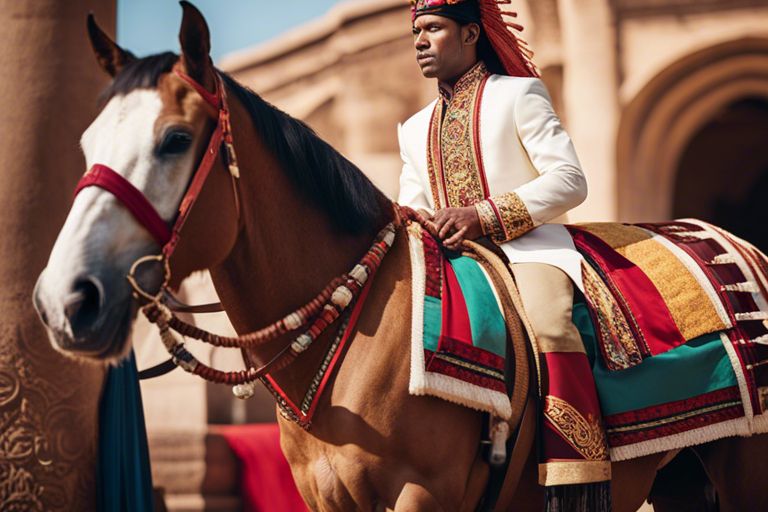
Cultural Variations
Horse in Indian Culture
Unlike some Western cultures, where horses are often associated with strength and power, in Indian culture, horses hold a significant place symbolically and spiritually. Any mention of horses in Indian mythology and history often brings to mind images of divine beings riding on majestic steeds. Horses are considered sacred in many Indian traditions and are associated with various gods and goddesses.
Horse in Arabian Culture
Unlike other cultures, where horses are primarily seen as symbols of status and wealth, in Arabian culture, horses are deeply intertwined with everyday life and hold a special place in the hearts of the people. One fascinating aspect of Arabian culture is the longstanding tradition of Arabian horse breeding, where the Bedouins bred horses for qualities such as speed, agility, and stamina.
Culture plays a significant role in shaping the way horses are perceived and valued in different societies. Arabian culture, in particular, has a deep-rooted connection to horses, with these magnificent animals being cherished for their beauty, loyalty, and grace. The bond between the Arabian people and their horses is truly unique and highlights the positive impact these animals have had on the cultural heritage of the region.
Final Words
Now that you have learned about the significant role that horses play in various cultures around the world, you may have a newfound appreciation for the bond between humans and these majestic animals. The history of horses and their impact on different societies is truly fascinating, showcasing the versatile and enduring nature of these creatures. Whether used for transportation, work, sports, or cultural ceremonies, horses have left a lasting impression on civilizations throughout history.
As you reflect on the diverse roles that horses have played in different cultures, consider how these animals have helped shape the world we live in today. From the nomadic tribes of Mongolia to the Spanish conquistadors, horses have been instrumental in shaping history and connecting people across continents. The next time you see a horse, take a moment to appreciate the deep-rooted cultural significance and timeless beauty that they bring to our lives.
Q: What role have horses played in different cultures throughout history?
A: Horses have had significant cultural, economic, and symbolic importance in various societies around the world for centuries. They have been used for transportation, agriculture, warfare, sports, and rituals, among other purposes.
Q: How have horses been important in Native American cultures?
A: In Native American cultures, horses were introduced by European colonizers and quickly became crucial for hunting, travel, and trade. They also held spiritual significance for many tribes, symbolizing power, freedom, and connection to nature.
Q: What role do horses play in European history and mythology?
A: In European history, horses played a crucial role in warfare, agriculture, and transportation. They were also central to many myths, legends, and folklore, representing strength, nobility, and heroism in cultures across the continent.
Q: How are horses depicted in Asian cultures?
A: In Asian cultures, horses have been revered for their beauty, grace, and speed. They have been featured prominently in art, literature, and religion, symbolizing loyalty, success, and good fortune in countries such as China, Mongolia, and Japan.
Q: What is the current significance of horses in modern society?
A: In modern society, horses continue to play a diverse range of roles, from competitive sports like horse racing and show jumping to therapy and rehabilitation programs for people with special needs. They also remain symbols of tradition, prestige, and the enduring bond between humans and animals.
